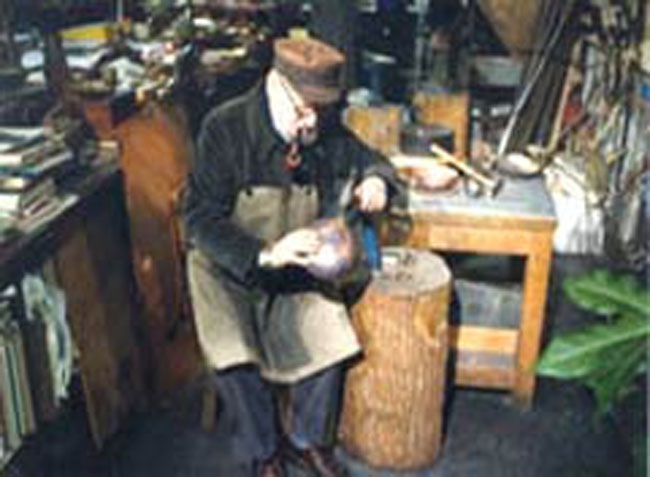Georges K. Glaser, écrivain et forgeron
-
Réalisé par Harun Farocki • Écrit par Harun Farocki
-
Allemagne • 1988 • 44 minutes • 16 mm • Couleur
- Réalisation :
Harun Farocki - Écriture :
Harun Farocki - Image :
Ingo Kratisch - Son :
Klaus Klingler - Montage :
Klaus Klingler, Rosa Mercedes
- Production (structure) :
Harun Farocki Filmproduktion - Diffuseur :
SWF - Südwestfunk (Allemagne), Baden-Baden TV - Ayant droit :
Harun Farocki Filmproduktion
- N° ISAN :
non renseigné
Résumé
Georg K. Glaser est un homme au destin mouvementé et à la personnalité hors du commun. Connu pour ses activités militantes contre le nazisme montant en Allemagne, il s’exile en France dans les années 1930, où il devient à la fois forgeron et écrivain. Dans cet entretien, filmé dans son atelier du Marais à Paris, Glaser livre sa vision globale du travail où ses deux activités se complètent pour former une parfaite alchimie.
"Glaser a commencé à travailler comme artisan, exprimant ainsi une critique en pensée et en pratique. Il combine l’artisanat avec l’écriture et souligne d’ailleurs que dans le mot français "artisan", la syllabe "art" n’a pas encore divorcé du travail manuel."
- Harun Farocki
"Georg K. Glaser is a worker and writer. Quite literally. He spends the morning at his desk, from midday on he can be found at his workshop in the Parisian quarter Marais. There he produces bowls, lamps, vases, jugs and other metal work. He is proficient in metalworking techniques hardly anyone else can perform these days. Born 1910 near Worms, Glaser ran away from home at an early age and went traveling; he was placed in reform institutions and joined the Communists. In 1933 he went underground and escaped via Saarland to France. There he became a naturalized citizen, worked for the national railroads, was conscripted in 1939 and soon found himself in German captivity. For years he had to pretend to be a Frenchman who could speak good German. After an escape and detention camp he returned to Paris and went to work for Renault. He found the work on the conveyor belt unbearable and inhuman. So almost 40 years ago now, Glaser started work as an artisan craftsman, expressing his criticism in thought and practice. He combines craftsmanship with writing and points to the French word for craftsman (artisan - where the syllable 'art' is not yet divorced from work)."
- Harun Farocki
"The activity somehow rubs off onto the writing. You write in a particular style, I would say craftsmanlike (...). Take any sentence - if you truly understand it, it just means it was pronounced with emphasis: 'Just in recent days, I have become conscious of it after decades; if consciousness includes seeing events in context, yet without encroaching on their distinctiveness, not to say independence, much as the lanterns above the gateways of farmsteads flung far apart and surrounded by walls still mark a path through the night landscape."
- G. K. Glaser
Mot(s)-clé(s) thématique(s)
Comment avoir accès au film ?
-
Édition DVD
- Il n'existe pas d'édition DVD à notre connaissance
-
Accès VOD
- Il n'existe pas d'accès en VOD à notre connaissance
- Distribution
- Aide sur les moyens d'accéder à un film
